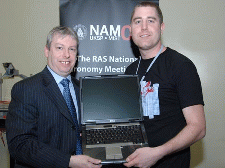
Jaz Pearson, a mathematics graduate of the Univeristy of Central Lancashire and now a research student within the Centre for Astrophysics, has won one of the top prizes at the 2008 National Astronomy Meeting taking place in Belfast this week. Against competition from hundreds of other research students from across the United Kingdom and beyond, Jaz’s poster presentation of his research into solar astrophysics was overwhelmingly recognised for the quality of the science as well as its presentation. He walks away with a top of the range Dell laptop pc for his efforts.

In a separate competition another of our research students Sotiris Adamakis has also won a prize for his presentation of the application of statistical techniques to the modelling of solar plasmas.
Working with their supervisor, Dr Robert Walsh, Jaz and Sotiris have been studying some of the largest eruptions in our solar system. Coronal mass ejections or solar storms throw out billions of tonnes of electrified gases from the Sun- when these plasma clouds strike the Earth’s magnetic field, they create beautiful aurora but also can badly affect radio communication, damage expensive satellites and short-circuit electrical transformers. Jaz has been working with observations from a new NASA satellite mission called STEREO which is allowing scientists to track these dynamic events like never before. Sotiris has been applying statisical techniques new to solar physics in order to better model the physical processes underlying what we see.
Jaz commented with characteristic modesty that he was “very surprised”. His supervisor added that it reflected his hard work and dedication since arriving at the University.
“The Sun is our nearest star,” said Dr Walsh, “and our work helps us to understand why it acts as it does, and how that might affect the Earth. Jaz and Sotiris are making an important contribution to our understanding of our stellar neighbour.”
The National Astronomy Meeting is an annual event sponsored by the Royal Astronomical Society and the Science & Technology Facilities Council. This year it is being hosted by Queen’s University, Belfast and has attracted 650 delegates.
The Centre of Astrophysics at the University of Central Lancashire was established in 1993 and comprises of around 35 professors, academics, research staff and students.
